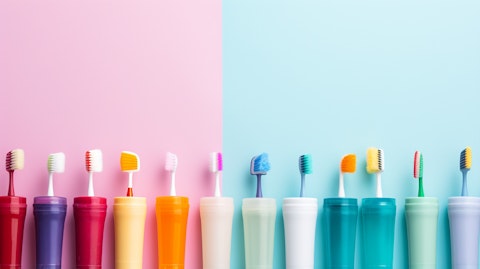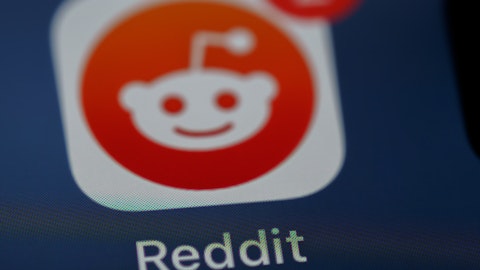We recently compiled a list of the 10 Best Household and Personal Care Stocks to Buy. In this article, we are going to take a look at where Colgate-Palmolive Company (NYSE:CL) stands against the other household and personal care stocks.
According to Grand View Research, the global market for beauty and personal care products is projected to increase at a CAGR of 7.7% from 2024 to 2030. The market was valued at $557.24 billion in 2023. Growing customer awareness of appearance is one of the main forces propelling market progress. In terms of type, in 2023 the conventional beauty and personal care market held the highest revenue share of 84.6%. Last year, the skincare segment brought in 33.7% of the total revenue from the beauty and personal care products market, while the market for haircare products is anticipated to expand between 2024 and 2030 at a CAGR of more than 8.1%. Regionally, the Asia Pacific beauty and personal care products market dominated the global market in 2023, accounting for 39.3% of total revenue, and is predicted to rise at a CAGR of approximately 9% from 2024 to 2030 as per the research.
Specifically, the market for personal care products in the United States was estimated to be around $73.17 billion in 2023 and is anticipated to grow at a CAGR of 6.1% between 2024 and 2030. The primary driver of the personal care products market’s expansion in the United States is the country’s aging population. The number of Americans 65 and older increased from 49.2 million in 2016 to 57.8 million in 2022, according to the US Census Bureau. In 2022, they made up 17.3% of the entire population. These individuals are primarily interested in healthcare products that help them retain a youthful appearance.
The purpose of regulations in the market for beauty and personal care goods is to guarantee product efficacy and consumer safety. Government organizations that regulate the industry, such as the European Commission in the European Union and the Food and Drug Administration (FDA) in the United States, set standards for product ingredients, labeling, and advertising.
On the other hand, Expert Market Research estimates that the global market for household care was valued at $106.40 billion in 2023. In order to reach a value of approximately $148.01 billion by 2032, the market is anticipated to grow at a CAGR of 3.7% during the forecast period of 2024-2032, according to the research. The market is being driven by a growing focus on cleanliness and health care, a growing popularity of washing machines, and the rising demand for household care goods like laundry detergents. In addition, the market’s primary regions include Europe, Asia Pacific, North America, Latin America, the Middle East, and Africa.
According to Deloitte’s 2024 consumer products industry outlook, as growing prices hit their limit in an unstable economy, the consumer products industry is predicted to shift from price-taking strategies to concentrating on “profitable volume” in 2024. Businesses that have performed well recently have demonstrated increased revenue and improved return on assets (ROA) by striking a balance between pricing power, innovation, and supply chain efficiency. The profitable expansion will depend on increasing volume while improving the product mix and holding onto as much pricing power as is practical, as additional price increases will encounter resistance from both retailers and cost-conscious consumers.
Advantageous mergers and acquisitions, strategic innovation, targeted advertising, and precision revenue growth management will be important strategies. Improved supply chain management and operational effectiveness are also essential. The consumer product executives Deloitte surveyed are cautious about maintaining volume and margin expansion in a difficult geopolitical climate, even with a positive outlook. It will be up to leaders to manage new and developing rules like the Corporate Sustainability Reporting Directive, GLP-1 weight-loss drugs, and generative AI.
Methodology:
We sifted through holdings of household and personal care ETFs and online rankings to form an initial list of 20 household and personal care stocks. Then we selected the 10 stocks that were the most popular among institutional investors. The stocks are ranked in ascending order of the number of hedge funds that have stakes in them, as of Q2 2024. We have used the stock’s market cap as a tie-breaker in case two or more stocks have the same number of hedge funds invested.
Why are we interested in the stocks that hedge funds pile into? The reason is simple: our research has shown that we can outperform the market by imitating the top stock picks of the best hedge funds. Our quarterly newsletter’s strategy selects 14 small-cap and large-cap stocks every quarter and has returned 275% since May 2014, beating its benchmark by 150 percentage points. (see more details here)

An array of toothpaste, toothbrushes, and mouthwashes on a bright background, highlighting the company’s oral care products.
Colgate-Palmolive Company (NYSE:CL)
Number of Hedge Fund Investors: 52
Colgate-Palmolive Company (NYSE:CL) is a company that produces and sells consumer goods. The segments that run it are Pet Nutrition, Oral, Personal, and Home Care. Products related to oral, personal, and home care include toothpaste, toothbrushes, mouthwash, bar and liquid hand soaps, shower gels, shampoos, conditioners, skin care products, dishwashing detergents, fabric conditioners, and household cleaners.
Over 40% of its total revenue comes from its branded oral care line. Sales outside of the country account for over 70% of its total revenue, with developing countries accounting for 45% of those sales.
While there are concerns regarding the security of consumers’ finances and ultimately their willingness to pay for the necessities in the company’s portfolio, the company is effectively managing the uncertain environment with caution. Under the direction of CEO Noel Wallace, CL has shifted its focus to spending more on R&D and marketing, i.e., on its core mix, in adjacent categories, and across the digital space, and responding more quickly to shifting consumer preferences. As a result, products are now on the market in less than six to twelve months, as opposed to the previous 18 to 36 months. Colgate’s long-term organic sales growth aim of 3%–5% has been met or exceeded for 22 consecutive quarters, proving the validity of this approach.
The company has spent an average of more than 12% of sales on marketing over the last four years, which is 120 basis points more than what was allotted in 2017–19. These results are attributed to increased brand spending and a renewed emphasis on consumer-valued innovation, even when it implies a higher cost.
ClearBridge Investments mentioned Colgate-Palmolive Company (NYSE:CL) in its Q2 2024 investor letter. Here is what the firm said:
“Colgate-Palmolive, added to the portfolio in 2023, started outperforming materially toward the tail end of last year as growth, margin and market share momentum began to turn favorably, and that momentum has continued year to date as the stock has nicely outperformed the large cap staples group. The fundamental upside has been driven by a combination of healthy organic growth (with positive volumes), good gross margin progression, and strong re-investment spending supporting market share gains and future growth.”
Jean-Marie Eveillard’s First Eagle Investment Management is the largest shareholder in the company, with 9,025,827 shares worth $875.87 million.
Overall CL ranks 3rd on our list of the best household and personal care stocks to buy. While we acknowledge the potential of CL as an investment, our conviction lies in the belief that some AI stocks hold greater promise for delivering higher returns, and doing so within a shorter time frame. If you are looking for an AI stock that is more promising than CL but that trades at less than 5 times its earnings, check out our report about the cheapest AI stock.
READ NEXT: $30 Trillion Opportunity: 15 Best Humanoid Robot Stocks to Buy According to Morgan Stanley and Jim Cramer Says NVIDIA ‘Has Become A Wasteland’.
Disclosure: None. This article is originally published at Insider Monkey.





